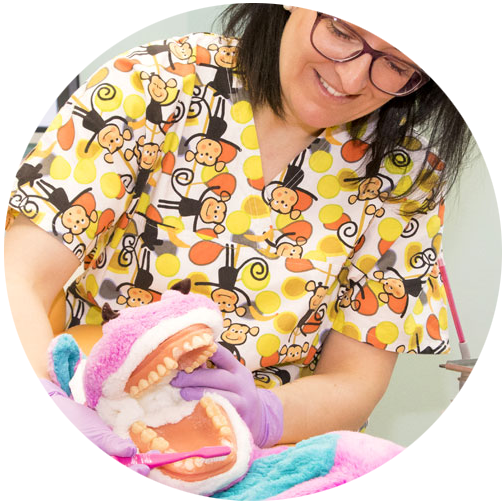
PREVENTION MEANS, MAKING SURE THAT TOOTH DECAY DOES NOT DEVELOP IN THE FIRST PLACE!
And how does tooth decay even start? Caries is a so-called multifactorial process, which means that if the balance between good and bad bacteria falls on the wrong side, i.e. the bacteria that cause caries become dominant, then cavities develop in the teeth. There are different risks at different ages. For us, prevention therefore also means informing you about the links between diet, oral hygiene and tooth decay and working with you to find a way to prevent future tooth decay in your child. Because if the links are clear, prevention is much easier!
ORAL HYGIENE
Oral hygiene appointments are not just about brushing your teeth thoroughly. Prophylaxis builds a good foundation!
- Without clean teeth, no dental filling treatment will be successful in the long term
- If oral hygiene is not sufficient, tooth decay will always occur somewhere.
- Oral hygiene is a great introduction to the world of dentistry. It offers children the opportunity to get to know our instruments in a playful way and to get used to the sounds and feel of them. It has been scientifically proven in many studies that a series of positive experiences makes it easier to cope with more difficult situations. In this way, we increase your child's self-confidence in oral hygiene and then manage the necessary filling at the next appointment. At the same time, the child's behavior during oral hygiene gives us a good indication of how he or she is likely to behave during treatment. This allows us to plan better and avoid disappointments in advance.
Our aims are therefore
- if possible, to primarily prevent tooth decay as part of an oral hygiene treatment
- where restorative treatment was already necessary - to keep the result under control and therefore stable
- that the child gets used to visiting a dentist
- to establish a long-term awareness of good dental hygiene.
Every age group has different priorities
That's why we have the toothbrushing toddler group, the toothbrushing kindergarten and, of course, the toothbrushing school. This allows us to respond individually to age-appropriate risks.
What happens during the oral hygiene treatment?
- Temporary colouring of teeth to make plaque visible
- Professional tooth cleaning
- Fluoridation
- Nutritional advice
- Practicing proper tooth brushing and flossing
Please bring your toothbrush and toothpaste from home so that we can see what you use and can practice with it. Thank you very much!
OUR ORAL HYGIENE APPOINTMENTS
If you have small children or children who are not yet at school, please come in the morning. Younger children are still receptive, well-rested and cooperative in the morning. After a busy morning at kindergarten, things can look very different and the appointment may not be as successful as you would like it to be.
School children prefer to come in the afternoon.
Of course, you can also make an appointment for a consultation before your child has their first teeth. This way you can implement everything right from the start.

